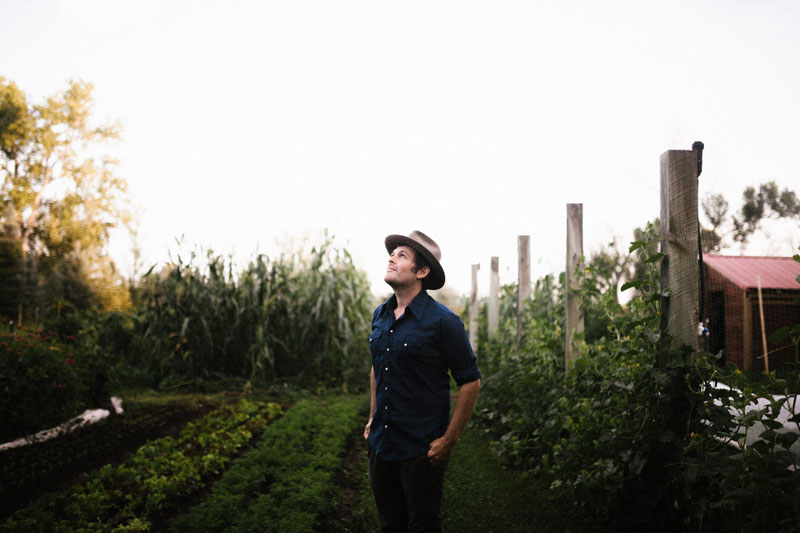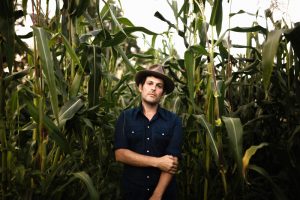INTERVIEW: Gregory Alan Isakov tills the good earth in soil and song

Gregory Alan Isakov
There are 18 weeks each year when singer-songwriter Gregory Alan Isakov suppresses his urges to put pen to paper, or hop into his DIY barn studio in rural Boulder, Colorado to record. That’s because those 18 weeks are farming season and Isakov, who owns a small farm, cares about working the earth as much as he does crafting lush melodies to lay atop heart-penetrating poems.
Gregory Alan Isakov
8 p.m., Thursday, Feb. 14
(w/ John Craigie)
8 p.m., Friday, Feb. 15
(w/ Laura Gibson)
The Fillmore
Feb. 14: Sold out
Feb. 15: $32.50
“I grow vegetables for a market, chefs, restaurants, a farmers’ market, a [community-supported agriculture] type of thing,” Isakov explains. “I have 50-foot beds. It ends up being about a quarter to a half an acre of production. I use a walk-behind tractor. I don’t use a four-wheel tractor. I grow a lot of salad greens, turnips, carrots, beets; a lot of quick-turning crops. Anywhere from about 25 to 40 days, I’m turning over that bed and planting something else. … And I grow for a seed company. I do a blue corn. It’s an heirloom corn that I sell to them.”
Isakov, 40, talks about farming with as much passion as he does about music. During farming season, he’ll rarely play any concerts. But over the next two months, the South-African-born, Philadelphia-raised Boulder artist will hit the road. It’s his first major tour since releasing his fourth album of new songs, October’s Evening Machines.
It’s his first album since 2016’s Gregory Alan Isakov with the Colorado Symphony, which featured orchestral versions of 12 of Isakov’s songs. His song “If I Go, I’m Going” was also recently featured on Netflix’s The Haunting of Hill House. Before that, his most recent album was 2013’s The Weatherman. That phase of his career was marked by two significant events: The first was creeping darkness that made him feel alone and isolated following two intense years of touring and the breakdown of a relationship.
Isakov closes Evening Machines with the atmospheric “Wings in All Black,” about that time of darkness, during which he had several anxiety attacks each week, but doctors couldn’t find anything physically wrong.
“When I kind of dusted myself of, I felt … a lot of compassion to this human experience of how hard it can be, and how amazing it could be, too,” he said.
He said that while he still doesn’t know how he did it, he was eventually able to climb out and motivate himself again.
“It took a lot of being quiet and a lot of slowing down,” he said. “I don’t know why or what it was, but I know that I felt an extreme amount of darkness that felt really real to me.”
The second event directly led to the new stage of Gregory Alan Isakov’s career—and life. In 2013, massive rainfall led to a devastating autumn flood that wrecked much of Colorado. Isakov’s apartment in downtown Boulder (he was working on other people’s farms at the time) was caught up in the “100-year flood,” and he lost everything.
He would spend much of the next two years living with other people, on tour in hotels, and for a little while, in a travel trailer.
“It was a huge self-reliant reminder that we’re fine wherever we are,” he said. “When I finally found land that was mine … it gave me a sense of place that I didn’t have before. … It felt so good to feel grounded again.”
The 12 tracks on Evening Machines—so named because Isakov worked mostly at night, watching the soft light emanating from his recording equipment—carry several other themes. The first one reflects another personal story of the artist. The album begins with the ruminative piano and strings ballad “Berth,” an immigrant story.
Even the song’s title recalls the docking of a ship in port. And that’s not something Isakov knew at the time he was writing and recording the song with his brother. “New York lady, holding in her heavy hand, sacred lantern, guiding dawn/ Quit all that looking back,” he sings.
Isakov moved with his family to Philadelphia from Johannesburg, South Africa in the mid-‘80s at the height of Apartheid.
“My dad is a really amazing guy. He’s really smart, and he didn’t want to have any part of that,” Isakov said. “He gave up a lot to move his whole family. He’s an electronic engineer, and he was able to start a business in Philadelphia to get a green card.”
All the boy knew of America was The Wizard of Oz and Disneyland. He and his brothers were scared. They’d grown up climbing avocado trees and picking mangoes. Philadelphia was cold, gray and crowded at first.
Because his parents were prohibited from taking most of their money with them, the family had to start all over, sharing a one-bedroom apartment in a building full of other immigrant families before eventually moving to a duplex.
Gregory Alan Isakov on discovering the Beatles later in life:
“I didn’t grow up with a lot of bands. I feel like a little bit of an alien when talking to my friends that are in bands, like, ‘Yeah, do you know that second Beatles record?’ And I’m like, ‘I don’t really know the Beatles.’ And they’re like, ‘What are you talking about?’ Then I got into the Beatles when I was 37, and I’m like, ‘That White Album was amazing.’ …
My friend made me this [chronological Beatles] mix … this 40-song or 50-song thing. I drove across the country and listened to it, and before I knew anything about the Beatles, I was like, ‘John Lennon is the cool one. The drummer guy; he’s kind of wacky. And then Paul McCartney is kind of like the dad or something.’ And I was like, ‘This is a John Lennon song, right?’ And she was like, ‘Nope. Paul McCartney.’ Paul McCartney is fucking amazing!“
“I asked my dad about that, and he said it’s the best decision he ever made,” he said.
Picking avocados doesn’t usually translate to a complete love of tilling land, and Isakov isn’t sure where his passion came from. But his mother has told him stories how, seeing Amish farmers near Philadelphia, he was jealous of their horses and the work they did. His first jobs were loading mulch onto others’ trucks at nurseries and landscaping companies.
His love of music developed concurrently, and he and his brothers played in bands together during childhood, but he never pictured music as a future for himself, so he pursued an agricultural education. After touring a university in Ithaca, New York, he found a program he liked at a Colorado school.
“I was interested in permaculture and sustainable farming and seed saving, and some kind of off-the-grid living … that I think a lot of my friends were into when I was 15, 16,” he said. “I’ve kind of had the same vision ever since.
Isakov’s songs are rife with agrarian influences that would make Pearl S. Buck smile. On “Too Far Away,” he sings at a leisurely pace about seeking out truth by comparing it to his other passion: “Me, I’ve been fine/ I work most of the time/ Digging for secrets deep in the ground.”
Instrumentation and melody building are another key signature of Gregory Alan Isakov’s songs. On Evening Machines, the sound is expanded wider than ever. Isakov, who determines what instruments will appear on each song before bringing in his band to complete it, again leaned on the violin, cello, guitar, bass and drums, Rhodes piano and Wurlitzer organ. But this time, he included more pedal steel, saw, banjo and electronic drums.
Some of the more electronic and atmospheric noises, such as the sound of an amp distorting, he refers to as “God noises.” Isakov likes to find as many of those as possible.
The symphonic elements stand out the most on “Powder.”
“My band has always had a lot of string elements. So I think the music translated well to a symphony [on the 2016 record],” he said. “I’m sure it did influence the new record. But … you start with one intention and just see what it wants to do. I’ve always noticed [the end result] is always a little different than what I set out to do.”
What’s interesting is that the sounds and melodies on his songs often don’t repeat. Rather than finding what works and coming back to it for added impact, Isakov keeps the action moving in one direction. The unique sounds are replaced with something new to keep each song moving forward.
His choices sometimes drive his band crazy, he confesses.
“A really good song takes you some place, and it brings you back different, or maybe it leaves you somewhere else,” he said. “It’s more of a ride than the songs that I was influenced by growing up, that are, just, ‘verse, chorus, let’s go back around to the verse; maybe a bridge and back to the chorus.’ But I think there’s a lot of power [when] you start out somewhere and it just takes you somewhere in a kind of effortless way.”
Follow editor Roman Gokhman at Twitter.com/RomiTheWriter.

